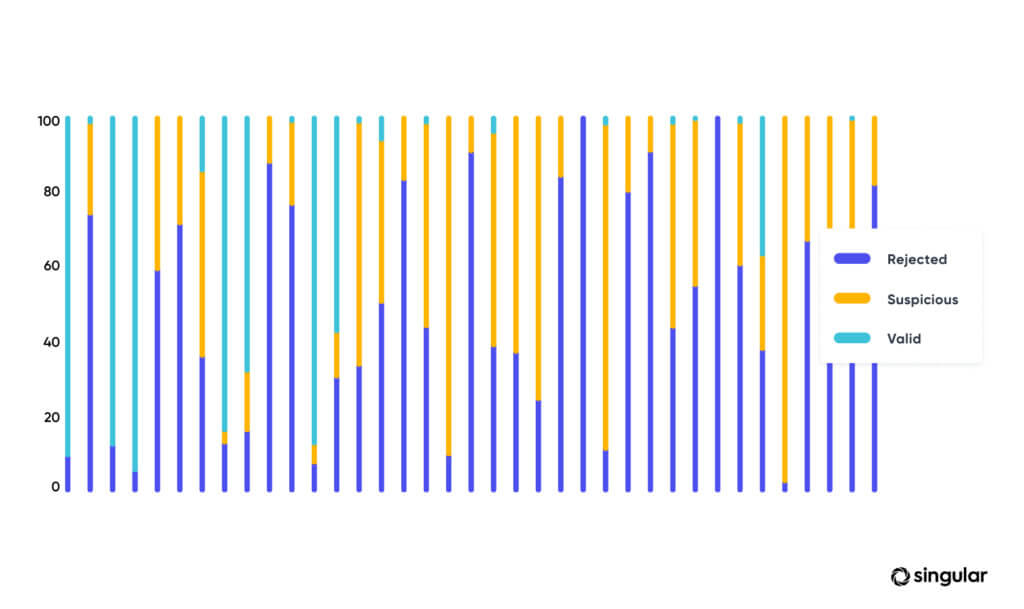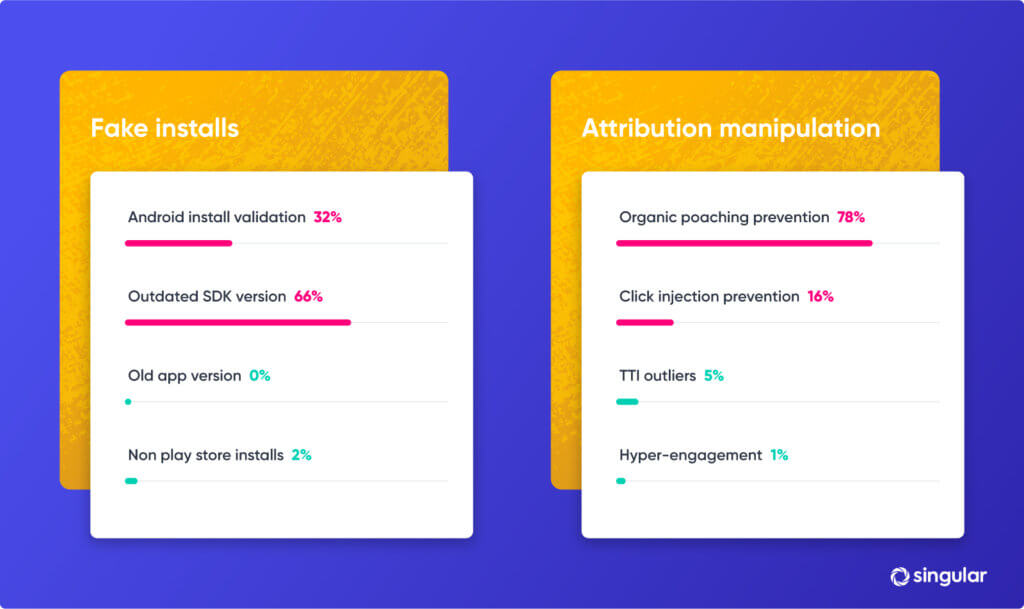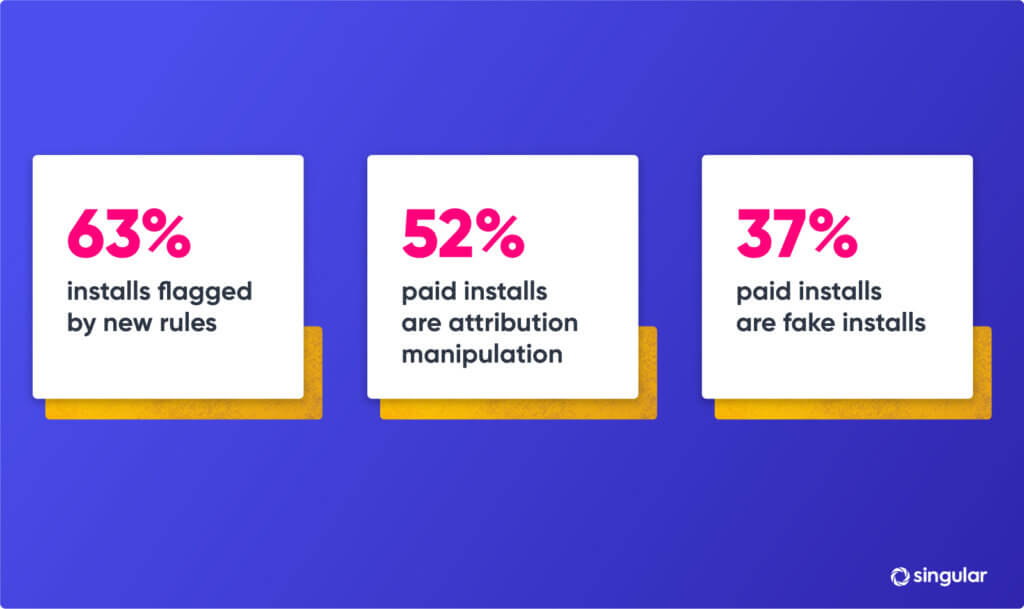2019 Fraud Report
The Death of App Install Fraud on Android
TLDR;

Digital ad fraud costs advertisers up to $19 billion, according to eMarketer. Or as much as $42 billion, according to Juniper Research. Whichever numbers you believe, it’s clear that fraud is widespread.
It’s also clear that more and more fraud is happening on mobile, where about 40% of digital ad dollars are being spent in the U.S. Mobile app install marketing is particularly troubled. 2018 saw 113 billion app installs just on Google Play and the App Store, and that’s growing to 258 billion installs across all app stores in 2022. With huge growth — and massive potential profits — marketers are now spending more than $40 billion/year on driving mobile app installs. But fraud is eating huge amounts of that spending.
Most marketers either don’t have fraud prevention, or their existing tools lack key cutting-edge capabilities. In fact, when we apply Singular’s ground-breaking fraud prevention technology to new Singular customers, it’s not surprising to see between 80 and 90% fraud rates in some of their paid mobile app install campaigns.
Not surprisingly, given those numbers, certain ad networks are close to 100% fraud.
Singular’s recently updated Fraud Prevention suite, including a new and global- first Android Install Validation tool, are deterministically identifying even more fraudulent attempts to steal app marketers’ dollars. Ultimately, we’re now able to proactively detect and remove fake impressions, clicks, and installs from even more customers’ campaigns.
The result: marketers are saving upwards of $100,000/week.
Just as importantly, marketers are now able to make smarter growth and investment decisions based on clean, accurate, and fraud-free data … and spend zero time on negotiating refunds from ad networks.
Fraud isn’t a solved problem for many marketers
Case in point: one new customer with a top-50 grossing app. This customer discovered that more than 95% of the installs they had been paying for from non-self-attributing networks were fraudulent when they activated Singular’s Fraud Prevention Suite.
How? Close to half were completely fake, while many of the real installs were being claimed by ad networks that did not drive them.
Not all brands experience this, but it can happen when marketers scale on a lot of ad networks quickly. Without the right fraud-fighting technology that targets app install fraud … and extreme due diligence, it’s easy to open the floodgates to fraud.
Rejecting the fake installs saved this customer more than $100,000/week.
Another customer? After turning Singular’s Fraud Protection suite on, they discovered that over 80% of their paid installs were fraudulent (again, from non-self-attributing networks).
While many ad networks are clean and relatively fraud-free, some routinely include 50% or higher fraud, and a few are close to 100% fraudulent. As we’ve shown in our report on Scaling Mobile Growth, marketers need diverse media sources to grow fast…but they also need to protect themselves from fraudsters.
Example: this is a view of another beta tester’s’ ad partners. Every column is a different ad network, and only green bars show clean, relatively fraud-free traffic:
While there’s been a lot of attention and work to combat app install fraud in the last few years, in many cases the fraudsters have been learning and evolving faster than the “fraud police.” To put it very simply: ad fraud is still a major problem.

Singular’s new deterministic fraud-fighting technology
To fight the most sophisticated fraudsters on the planet, we’re harnessing the power of big data: analyzing more signals in higher volume. In June 2019 alone, Singular measured 70 billion ad impressions, almost 11 billion clicks, almost 6 billion app installs, and almost $350 million in ad spend. We’re also digging deeper, analyzing detailed signals from individual impressions, clicks, and app installs at greater depth to uncover suspicious activity.
That volume — and depth — are just two of the reasons Singular was recently able to unveil three new fraud-fighting technologies that collectively have become part of our already industry-leading Singular Fraud Prevention Suite:
- Android Install Validation
- Android Organic Poaching Prevention
- Android Click Injection Prevention
1. Android Install Validation
This is a true breakthrough in fake install detection on Android. Singular’s fraud research team has discovered new state of the art signals that can be used to deterministically judge whether an Android install is genuine or fake.
Important note: This is not a probabilistic guess: we are validating that each specific install for a specific device and specific user is real or not.
2. Android Organic Poaching Prevention
Fraudsters fabricate fake clicks to try to poach organic installs by claiming credit for conversions they did not influence. Singular detects these attempts and ignores them.
Relying only on mean time to install (MTTI) has proven to be an ineffective method. Singular also uses signals from the Play Store to determine if a legitimate ad click occured, or if an organic user is being poached.
3. Android Click Injection Prevention
Fraudsters also poach installs that other ad networks have driven, injecting fake clicks after detecting an impending install event. Singular detects these and ignores them as well.
Existing methodologies
These new methods join existing Singular app install fraud prevention methods, which have also been updated and strengthened:
- iOS Install Validation
- Hyper Engagement
- Time to Install Outliers
- Blacklisted IP Addresses
- Geo Bleed
- Outdated SDK Version
- Outdated App Version
- Non-Play Store Install
- Click/Install Origin Country
- Blacklisted Publishers
In addition, Singular provides many more fraud signals that can be incorporated into our custom rules system, which empowers marketers to customize their own
fraud standards.
Two global clients: Saving over $500,000 monthly
Singular beta-tested these new fraud-fighting technologies with global customers who spend tens of millions of dollars yearly in mobile marketing and mobile user acquisition.
Global client #1
Saved $500,000 monthly
One beta test customer owns one of the top-grossing iOS games on the planet [1]. Using Singular’s new fraud tools, the client discovered that more than 90% of the app installs they were paying for were fraudulent. That saved them more than $500,000/month. In addition, the client discovered and blocked close to $25,000 in fraudulent in-app purchases in just one of their top apps over the span of a week.
Fraud methods found by Singular’s Fraud Prevention Suite

Global client #2:
49.5% of paid installs impacted by attribution manipulation
Another global client in an on-demand services industry discovered that almost 50% of their paid installs suffered from attribution manipulation [2]. The wrong ad partner was getting paid (showing that fraud cheats ethical ad networks as well as advertisers).
Attribution manipulation at this level is dangerous because when it happens, marketers cannot make optimal decisions about future budget allocation. If Network A caused 10,000 profitable installs while Network B only contributed 2,000, you’ll probably increase spend on A. But if B actually caused them while A falsely takes credit, any future marketing decisions you make are based on false data.
The result is that your overall metrics — and profitability — will suffer.
Getting the right data allowed this customer to make different marketing investment decisions, saving them additional money and accelerating growth on their most important metrics: ROI, customer growth, and real return on ad spend.

1 Note: some minor details have been changed to protect the customer’s privacy.
2 Again: some details changed to protect privacy.
Singular’s fraud prevention principles
It’s easy to say that you fight app install fraud, or catch mobile fraud. It’s another thing to do it effectively.
Singular’s cyber security team is constantly monitoring anomalies and abnormal behavior, checking a wide array of signals. Once we find something that is abnormal, we dig deep to find the root cause and find a deterministic way to fight that fraud methodology. Once we’ve found a deterministic way to identify that new species of fraud, we automatically block it. In short, we’re emulating the way fraudsters think and reverse engineering their schemes.
Here are the principles behind Singular’s Fraud Prevention Suite.
Deterministic
Singular strives to have no false positives. We want to clearly identify fraud at a granular level. So Singular’s fraud results apply to actual individual installs, devices, and users, not blanket-level sources or publishers.
Proactive
Finding fraud after it has already occurred is too late. Advertisers have already paid for traffic or users or customers, and then they’ll have to engage in time-consuming and difficult cost reconciliation conversations with partners.
A potentially bigger problem when you let fake users in: marketers get fraudulent engagement and purchase data along with the fake users, muddying your analytics and making it hard to decide where to re-invest. And even worse, legitimate ad networks’ algorithms can adapt to the fraud in real time, de-prioritizing campaigns and sources that are actually working because they are getting fewer installs attribute`wd, thanks to theft by the fraudsters.
It is absolutely critical to eliminate fake installs
before attribution.
Transparent
Both advertisers and ad networks need to know what constitutes fraud, and they need transparent reasons why traffic, installs, or other activity has been classified as fraud. So Singular provides user-level decision logic for every single install, click, and impression.
Customizable
No marketer wants fraud. But marketers do want to personalize their fraud prevention strategies and define how aggressive they want to be. A marketer using largely self-attributing networks like Facebook, Google, Apple, Snap, and Twitter prefers a different strategy to one who is using many different niche ad networks,
for example.
Singular lets customers decide both the fraud rules they’ll use and what actions they’ll take upon finding suspicious activity.
Get your own custom #fraudit
We’d like to help you ensure that all of your installs are valid, clean, and fraud-free. If you’re an app publisher, let’s talk.
We’ll bring in our cyber-security team for a full audit of your traffic from all your sources, validating that your installs, conversion, engagement, and in-app purchases are valid, accurate, and fraud-free.
Fed up with app install fraud?
- Request a #fraudit today. Email us at fraudit@singular.net
- Dive deeper into fraud. Learn more about our Fraud Prevention
About Singular
Singular is a marketing intelligence platform that transforms marketing data into accurate, granular and actionable insights to drive growth. By unifying marketing campaign data with attribution data, marketers can measure ROI from every touchpoint across multiple channels for a single source of truth. Singular currently tracks over $10 billion in digital marketing spend to revenue and lifetime value across industries including retail, finance, travel, gaming, entertainment, media, and on-demand services. Singular customers include companies like Lyft, Yelp, Airbnb, LinkedIn, Symantec, Zynga, Match, and Twitter.